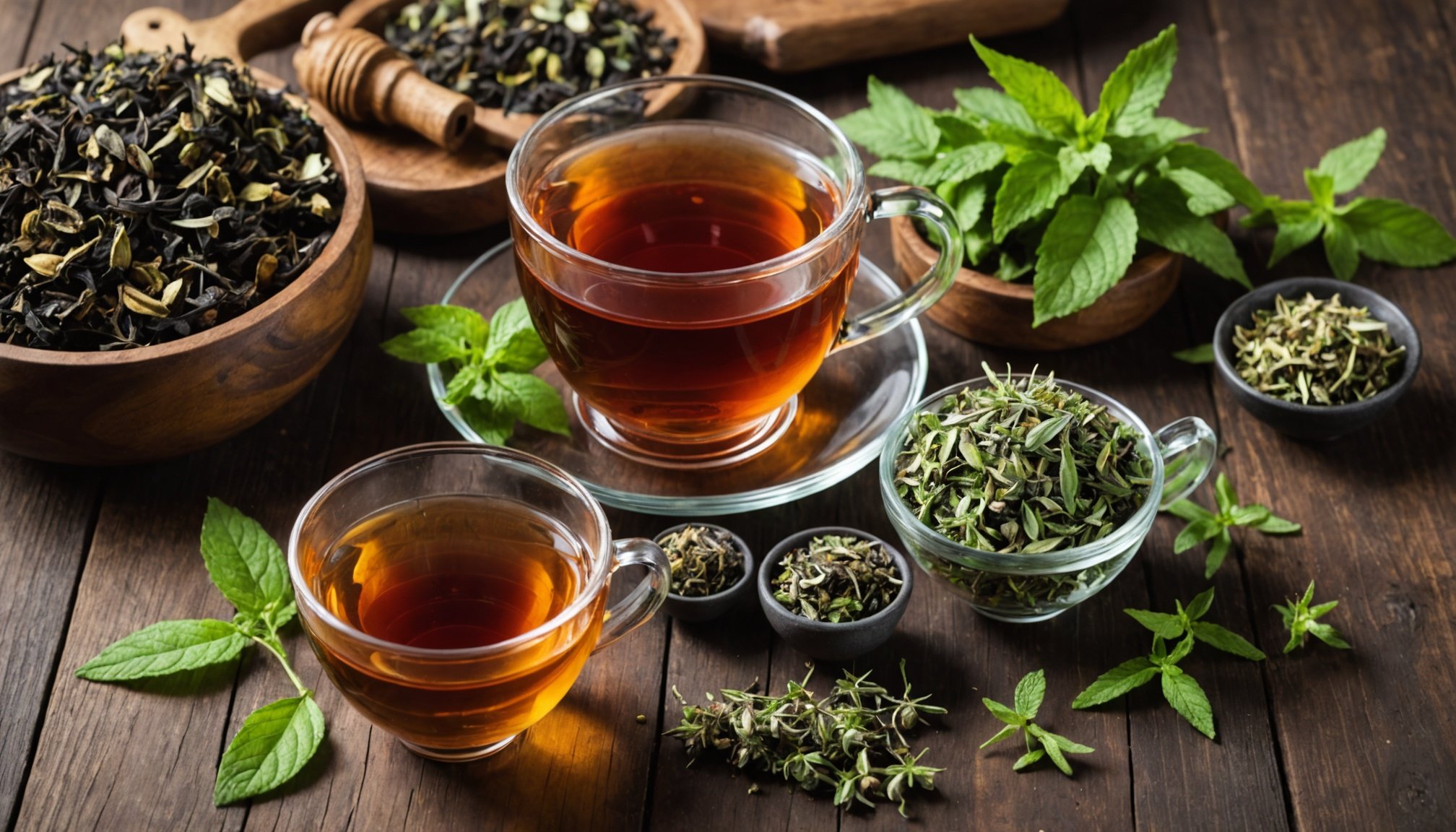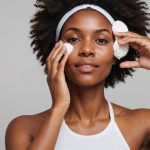Unlock the Secrets of Herbal Teas for Glowing Skin and Lustrous Hair: A Comprehensive Beauty Guide
In the quest for radiant skin and healthy hair, many of us have tried a myriad of products and treatments, often with mixed results. However, there is a simpler, more natural approach that has been gaining traction in the beauty world: herbal teas. These teas, infused with the power of nature, offer a holistic solution to various skin and hair issues. Let’s delve into the world of herbal teas and explore how they can become an integral part of your beauty rituals.
The Science Behind Herbal Teas for Skin and Hair
Herbal teas are not just a soothing beverage; they are packed with antioxidants, vitamins, and minerals that can significantly impact your skin and hair health. According to Dr. Swathi, Head of Research and Product Development at Herbal Chakra, “Herbal teas act internally, reaching the skin through blood circulation and providing the required nourishment. They are essential for maintaining healthy, well-nourished, and glowing skin”[2].
Key Ingredients and Their Benefits
Here are some of the key ingredients commonly found in herbal teas and their specific benefits for skin and hair:
-
Saffron and Cardamom:
Also to see : The future of fragrance: robertet’s commitment to nature
-
These ingredients are part of the “ultimate skin tea” recipe suggested by content creator Dolly Shah. Saffron is known for its anti-inflammatory and anti-microbial properties, while cardamom aids in digestion and can help in purifying the blood and regulating hormones[1].
-
Hibiscus and Chamomile:
-
Hibiscus is rich in vitamins and minerals and is known for its anti-inflammatory properties. Chamomile, on the other hand, is a soothing herb that can calm irritated skin and promote better sleep, which is crucial for overall skin health[2].
-
Turmeric and Ginger:
-
Turmeric contains curcumin, a powerful antioxidant with anti-inflammatory properties that can help in reducing acne and promoting collagen production. Ginger is known for its warming properties and can aid in digestion, which is essential for healthy skin and hair[2].
-
Black Tea:
-
Black tea is rich in antioxidants and tannins that can help in fighting skin infections, reducing under-eye puffiness, and slowing down premature aging. It also has benefits for hair, such as preventing hair fall and stimulating hair growth[3].
How to Incorporate Herbal Teas into Your Beauty Rituals
Incorporating herbal teas into your daily routine is simpler than you think. Here are some practical tips to get you started:
Preparing the Perfect Cup
-
Skin Tea Recipe:
-
To make the “ultimate skin tea,” boil water and add 3 strands of saffron, 6 pods of cardamom, 1 tsp of ghee, ginger, and mulethi (licorice). Let the concoction boil for 3-4 minutes, then strain and drink[1].
-
Beauty Tea Blends:
-
For a more general beauty tea, you can blend herbs like hibiscus, chamomile, and turmeric. These teas can be consumed mid-morning and in the evening for optimal benefits[2].
Timing and Frequency
-
Best Times to Drink:
-
According to Dr. Swathi, the best times to consume herbal teas are mid-morning and in the evening. This helps in maintaining internal hydration and providing continuous nourishment to the skin[2].
-
Consistency:
-
Consistency is key. Make herbal teas a part of your daily routine, just like brushing your teeth or taking a shower. This will help you see noticeable improvements over time.
Ayurvedic Approach to Skin and Hair Care
Ayurveda, the ancient Indian system of health and wellness, offers a holistic approach to skin and hair care. Here’s how you can align your beauty rituals with Ayurvedic principles:
Internal Hydration
-
Herbal Teas:
-
Ayurveda emphasizes the importance of internal hydration. Drinking warm herbal teas like fennel, licorice, or chamomile helps in keeping the skin hydrated from within[4].
-
Water Intake:
-
Staying hydrated is crucial. Drink plenty of water throughout the day to ensure your skin and hair receive the necessary moisture.
Balanced Diet
-
Seasonal Eating:
-
Ayurveda advocates for seasonal eating, choosing foods that naturally grow in the current season. This ensures you are in harmony with the environment and helps in maintaining skin and hair health[4].
-
Healthy Fats and Antioxidants:
-
Include foods rich in healthy fats, antioxidants, and natural hydration in your diet. These nutrients support skin health at a cellular level.
External Care
-
Abhyanga (Self-Oil Massage):
-
Daily self-massage with warm oil, or abhyanga, is a cornerstone of Ayurvedic skincare. This practice nourishes the skin, enhances circulation, and balances the nervous system[4].
-
Natural Cleansers:
-
Use natural, mild cleansers like chickpea flour or milk to cleanse your skin without disrupting its natural barrier.
Specific Herbal Remedies for Common Issues
Here are some specific herbal remedies that can help with common skin and hair issues:
For Acne and Blemishes
-
Neem:
-
Neem is hailed as the “great detoxifier” in Ayurveda. It has potent skin-normalizing properties and can be used to treat acne and reduce redness. Apply neem oil topically or mix neem powder with water or rosewater for a gentle face mask[4].
-
Black Tea:
-
Black tea has antioxidants that can help in reducing blemishes and preventing skin infections. You can drink black tea or apply it topically using a cold tea-soaked cotton ball[3].
For Hair Fall and Premature Greying
-
Fenugreek:
-
Fenugreek seeds are rich in protein, micronutrients, and lecithin, which help in strengthening hair, reducing dandruff, and promoting hair growth. You can make a DIY fenugreek mask by mixing fenugreek seeds with hibiscus and black tea[5].
-
Amla:
-
Amla, or Indian gooseberry, is known for its hair growth promoting properties. It can be consumed as a juice or applied topically as an oil to stimulate hair growth and prevent premature greying.
Practical Insights and Actionable Advice
Here are some practical tips and actionable advice to help you integrate herbal teas into your beauty routine:
Create a Routine
-
Start Small:
-
Begin by incorporating one herbal tea into your daily routine. As you see the benefits, you can gradually add more varieties.
-
Be Consistent:
-
Consistency is key. Make herbal teas a part of your daily ritual, just like any other skincare or haircare routine.
Combine with Other Natural Remedies
-
Use Herbal Oils:
-
Combine herbal teas with other natural remedies like sesame oil, coconut oil, or aloe vera for enhanced benefits. For example, using sesame oil for self-massage can deeply moisturize the skin and promote a soft, supple complexion[4].
-
Incorporate Herbal Masks:
-
Use herbal masks like the fenugreek and hibiscus mask to promote hair growth and reduce dandruff. Apply these masks once or twice a week for noticeable results[5].
Who Should Avoid Herbal Teas?
While herbal teas are generally safe for everyone, there are a few precautions to keep in mind:
Medications and Allergies
-
Consult Your Doctor:
-
If you are on any medication, it is better to check with your health practitioner before consuming herbal teas. Some herbs may interact with medications or exacerbate certain health conditions[2].
-
Allergies and Sensitivities:
-
If you have sensitivities or allergies to specific herbs, it is advisable to refrain from consuming them. Always read the packaging and look for any allergen warnings.
Herbal teas offer a natural, holistic approach to achieving glowing skin and lustrous hair. By understanding the science behind these teas, incorporating them into your daily routine, and aligning your care with Ayurvedic principles, you can unlock a world of beauty benefits. Remember, beauty is not just about external care; it starts from within. So, brew a cup of beauty today and embark on a journey towards radiant skin and healthy hair.
Table: Key Benefits of Common Herbal Teas for Skin and Hair
| Herbal Tea | Key Ingredients | Benefits for Skin | Benefits for Hair |
|---|---|---|---|
| Skin Tea | Saffron, Cardamom, Ghee | Treats acne, pigmentation, dark spots; purifies blood | Prevents premature greying; promotes hair growth |
| Beauty Tea | Hibiscus, Chamomile, Turmeric | Boosts collagen; reduces under-eye puffiness | Promotes hair growth; adds shine and luster |
| Black Tea | Black Tea Leaves | Fights skin infections; delays skin aging | Prevents hair fall; stimulates hair growth |
| Fenugreek Tea | Fenugreek Seeds | – | Strengthens hair; reduces dandruff; promotes growth |
| Amla Tea | Amla (Indian Gooseberry) | – | Promotes hair growth; prevents premature greying |
Detailed Bullet Point List: Ayurvedic Foundations for Winter Skin Care
-
Hydrate Consistently:
-
Sip on warm herbal teas throughout the day to maintain internal hydration.
-
Include herbs like ashwagandha and shatavari to balance Vata and other doshas.
-
Energizing Foods:
-
Include warming spices such as ginger and black pepper in your diet to support digestion and prevent sluggishness.
-
Abhyanga (Self-Oil Massage):
-
Perform daily self-massage with warm oil to nourish the skin, enhance circulation, and balance the nervous system.
-
Gentle Cleansing:
-
Use natural, mild cleansers like chickpea flour or milk to cleanse without disrupting the skin’s barrier.
-
Balanced Diet:
-
Focus on whole foods rich in healthy fats, antioxidants, and natural hydration.
-
Choose seasonal foods that naturally grow in the current season.
-
Regular Exfoliation:
-
Gently exfoliate 1–2 times per week with natural scrubs like oatmeal or chickpea flour to improve circulation and prevent buildup.
Quotes from Experts
-
“Herbal teas act internally, reaching the skin through blood circulation and providing the required nourishment. They are essential for maintaining healthy, well-nourished, and glowing skin.” – Dr. Swathi, Head of Research and Product Development at Herbal Chakra[2].
-
“It is essential to understand the root cause of these problems, and then create a tailored treatment plan to resolve them. There could be various factors that could lead to skin problems and hair fall such as vitamin and mineral deficiency, genetics, poor eating habits, hormonal imbalance, stress, depression, and certain medications.” – Dr. Rinky Kapoor, Consultant Dermatologist[1].
By embracing the natural beauty of herbal teas and integrating them into your daily beauty rituals, you can achieve that radiant glow and lustrous hair you’ve always desired. So, go ahead, brew a cup, and let the magic of nature work wonders for your skin and hair.











